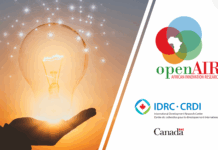The Open AIR Case Study Workshop as told by Twitter
By Katie Degendorfer
Last month, Open AIR launched our inaugural case study workshop at the Centre for Intellectual Property and Information Technology (CIPIT), part of Strathmore University’s Law School in Kenya, and one of Open AIR’s hubs. The workshop sought to provide successful case study participants with an opportunity to present their proposals and brainstorm with their colleagues.



With researchers across the African continent, Open AIR has expanded to become a large, overarching umbrella network of individuals and organizations.


During the breakout sessions, participants were eager to contribute valuable insights to each others projects and strengthen the links between Open AIR’s four priority research themes: (1) high technology hubs, (2) informal sector innovation, (3) indigenous entrepreneurs, and (4) metrics, law and policies.


The presentations by case study participants and the subsequent breakout brainstorming sessions proved to be invaluable as theme leaders and colleagues posed questions, problem-solved issues, and suggested creative solutions. Additionally, the case studies helped identify which projects would be apt for cross-comparative analyses.


The workshops were categorized around research themes, beginning with the panel on high-technology hubs.


The second panel was on informal sector innovation with important considerations about how to define “innovation”.


The indigenous entrepreneurship panel capped off day 1, with insights about the use of traditional knowledge, knowledge governance structures, and the role technology plays.

Day 2 included panels on proposals that were characterized as “crosscutting”, i.e. they touched upon more than one theme and couldn’t be boxed into one. This also included our fourth theme: metrics, law and policies.


Day 3 of the conference was focused on research methodology, ethics protocols, and reporting and monitoring. For research methodology a takeaway was the focus on “grounded theory” research. Equally important was that ethical research is crucial, especially since research is being conducted in different countries with different processes; as researchers we need to adhere to the highest ethical standards!

Finally, the workshop focused on reporting and monitoring; a key objective of our work is to improve performance, achieve results, and make sure that our findings are shared broadly.


It was an exciting 3 days and we can look forward to seeing the benefits of all the collaborative effort that went into “workshopping” the case studies in the year to come!


Special thanks to SSHRC and IDRC for their support of the project, as well as GIZ, the Shuttleworth Foundation, OSF foundation and all of the hub institutions who have provided significant support!










